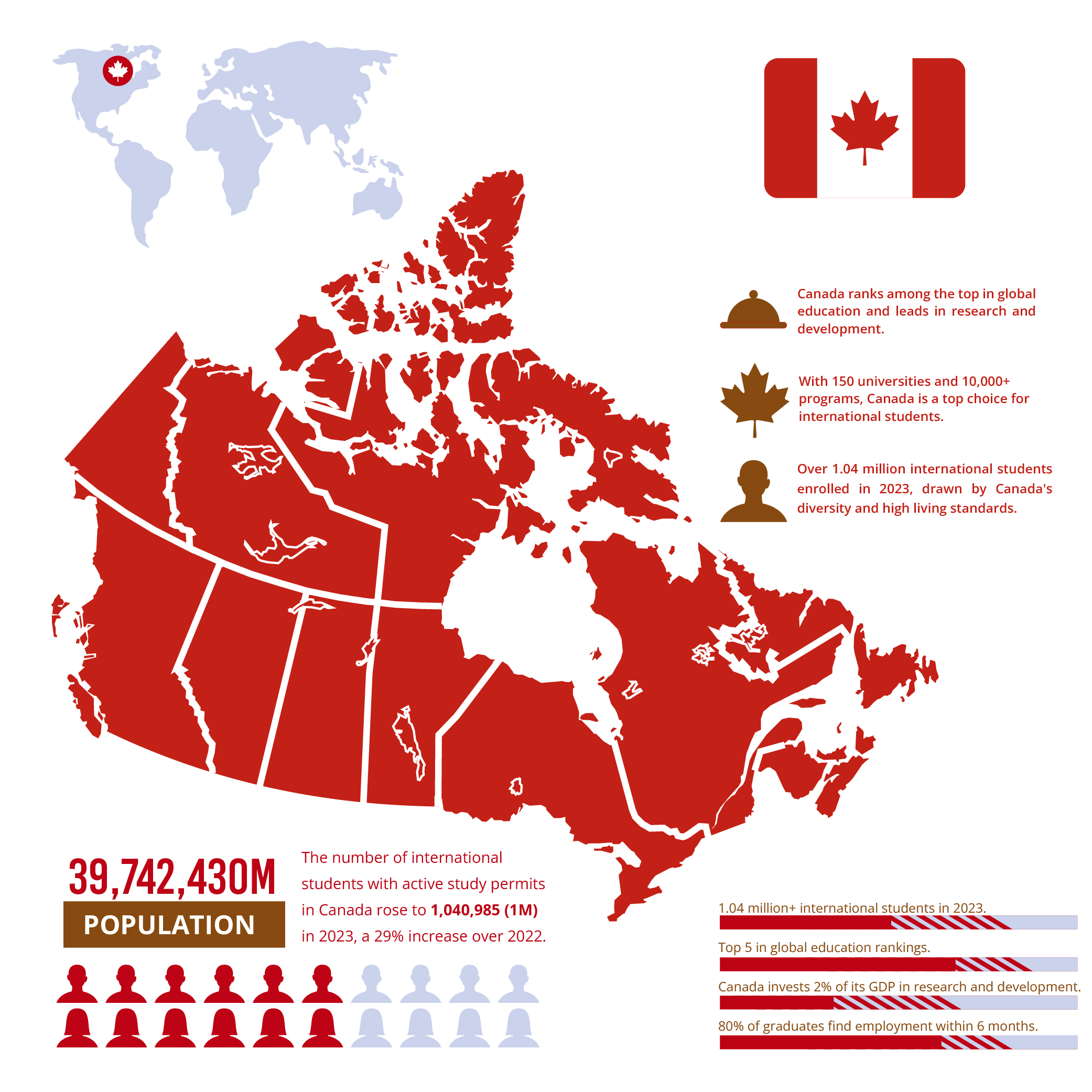Canada
The main reason to the international students for choosing Canada for their further study is the quality of Canadian education. The Canadian degrees are also respected and expected throughout the world like UK, Australia, USA and so on. The quality of education and living standards in Canada are amongst the highest in the world, but the cost of living and tuition fees for international students are generally lower than in other countries such as the United States and the United Kingdom.
With almost all of the world’s ethnic groups represented in Canada, its hard not to find ethnic foods and recreation activities associated with specific cultures as it is the top vibrant multicultural country around the globe.
Overview
| Official Name | Dominion of Canada |
| Capital | Ottawa |
| Official Language | English, French |
| Name of Prime Minister | Justin Trudeau |
| Area | 9,984,670 Km² |
| Population | 40 Million (2023) |
| Currency | Canadian Dollar (CAD $) |
| Total GDP | 1.988 Trillion $ (2021) |
| Listed Education Institution | 149 |
| Study Programmes | 15,000 |
| Dialing Code | +1 |
Why Canada ?
Admission Requirements
For Bachelor’s Students
To study for a bachelor’s degree in Canada as a student from Bangladesh, you’ll need to meet several requirements. Here’s a general outline:
- Passport
- Birth Certificate/NID Card
- Higher Secondary School Certificate
- Higher Secondary School Transcripts/Marksheet
- Secondary School Certificate
- Secondary School Marksheet
- English Proficiency Certificate (IELTS : 5.5-6.5/Equivalent TOEFL/PTE)
- Present Study Letter
- Curriculum Vitae (CV)
- Motivation Letter / Statement of Purpose
For Master’s Students
To study for a master’s degree in Canada as a student from Bangladesh, you’ll need to meet several requirements. Here’s a general outline:
- Passport
- Birth Certificate/NID Card
- Bachelor’s Certificate
- Bachelor’s Transcript
- Higher Secondary School Certificate
- Higher Secondary School Transcripts/Marksheet
- Secondary School Certificate
- Secondary School Marksheet
- English Proficiency Certificate (IELTS : 6.5/Equivalent TOEFL/PTE)
- Curriculum Vitae (CV)
- Motivation Letter / Statement of purpose
- 02 Recommendation Letters
- Job Letter with your responsibilities
Working Opportunities
Who can work off campus
Student and employer must make sure student can work off campus without a work permit before student start working. If student start working off campus but don’t meet the requirements, student may have to leave Canada.
Student can only start working in Canada when their study program has started. Student can’t work before you start your studies. If student is able to work during your studies, it’ll say so in the conditions on your study permit. If student is eligible for off-campus work, student don’t need a work permit.
Student can work up to 20 hours per week. Student can work more than 1 job to make up these hours as long as you continue to meet the conditions of your study permit. Student can work full-time if they are on a scheduled break, such as winter and summer holidays, or a fall or spring reading week. They are free to work overtime or work 2 part-time jobs that add up to a higher than usual number of hours. They must be a full-time student both before and after the break to work full-time.
They can’t work during a break that comes before you start your very first school semester. There is no set number of hours per week that counts as ‘full-time’ work. However, your employer(s) must follow all provincial laws on overtime pay and time between shifts.
Self-employed students
If student is a self-employed person, they are also responsible for keeping track of the hours you work off campus and proving that they are complying with the conditions of your study permit.
Hours are calculated as any time you spend doing any of the following:
- Earning wages
- Being paid wages for performing a service or selling a product
- Collecting a commission for performing a service or selling a product.
Who can’t work off campus
Student can’t work off campus without a work permit if any of these situations apply to you:
- Student study permit says they aren’t authorized to work off campus while you study.
- They are only enrolled in an English or French as a second language (ESL/FSL) program.
- They are only taking general interest courses.
- They are only taking courses required to be accepted into a full-time program.
- They are situation changes and they no longer meet all of the requirements to work off campus.
Working outside Canada
Student can work remotely for an employer outside Canada as long as you still meet the conditions of your study permit. This type of work doesn’t count towards your 20 hours per week off-campus work limit.
Most Preferable Universities
Approximate Study Cost
| Sl No. | Name of the Course | Cost in CA$ / Year |
|---|---|---|
| 01 | Diploma / Advanced Diploma | 10000 - 15000 |
| 02 | Bachelor Program | 15000 - 36000 |
| 03 | Master Program | 12000 - 21000 |
Approximate Living Cost
| Sl No. | Name of the Course | Cost in CA$ / Year |
|---|---|---|
| 01 | Student | 27000 |
| 02 | Spouse | 18000 |
| 03 | Children | 12000 |




